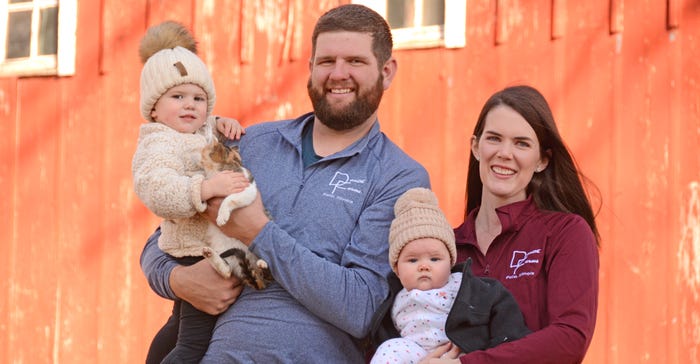
Who builds a new hog building on the end of some of the worst hog years in recent history?
A young farmer, that’s who.
Back in 2010, Michael Deuth took a chance. He was 24 years old and he’d been farming with his dad, John, and brother, Daniel, for four years near Polo, Ill. 2008 and 2009 were some of the worst years ever in the hog industry, combining high feed prices with low hog prices. But Deuth says a new building was a risk he had to take.
“I knew if we were going to be in the hog industry, we had to do it. Either get in the hog business and do this, or get out,” he recalls.
Deuth says hog producers’ success turns on three hinges: health, market availability and performance. Their downfall was performance, thanks to their old buildings. The new building improved performance through feed gains, pig flow and overall health, improving margins all along the way.
He ultimately applied to the Environmental Quality Incentives Program to help fund the 1,700-head finishing building. EQIP funds covered about half the building’s $400,000 cost, including access and manure storage. EQIP monies specifically offer cost-shares on waste containment and management, composting, bio-disposal of animals, road access, and drainage tile.
The process wasn�’t simple, and it took over a year to get all the paperwork, plans and best management practices filed, but Deuth says it was worth it.
“Those programs take a lot of work and they’re frustrating — but I never would have been able to build it without it,” he says of EQIP funding. Plus, he was 24 and didn’t have any money or assets. “A lender never would’ve lent me money for a building.”
Building in a downturn also improved his negotiation power. “Builders were anxious to build,” Deuth recalls.
The investment paid off on his balance sheet, too. Deuth built equity in the operation for himself and for his family, and the return on investment has been solid. He was able to pay off the building early and use his Farm Service Agency note to invest in farm ground.
“That worked out really well for me,” he says. He was also able rent part of the building back to his dad and brother, who he farms in partnership with. Together, they built two more buildings on the same site in 2012 and 2018.
Today, the Deuths market 25,000 pigs annually. As a percentage, his dad owns 40% of that business and the brothers own 60%. They also raise 1,800 acres of corn, soybeans, wheat and pasture, and run about 140 head of beef cows and finish 100 head of steers annually.
Looking back, Deuth sees nothing but benefit from that 2010 hog building — including the manure they can use on farmland.
“I’m really glad I built the hog building,” he reflects. “It changed the way we did things, and it was a big risk that paid off.”
Back home
You could say Michael and Mallory Deuth are big fans of the new year: They met on one New Year’s Eve and married later on New Year’s Eve 2016.
Mallory, a Mount Pulaski native, was working in Chicago on that fateful New Year’s Eve. They clearly hit it off, marrying and soon beginning their life together on his family’s Polo farm. By 2018, the family did a generational house switch: Michael and Mallory moved into his parents’ house on the homeplace, and his parents, John and Jean, moved into his grandparents’ house.
Mallory works from home as a logistics manager for Coyote Logistics. Day to day, that means she helps organize and ship Coca-Cola products all over the U.S. She also helps on the farm and with social media for the meat business Jean runs, Deuth Farms Meats.
Michael and Mallory are parents to Ellis, 3, and Emery, 18 months, and are members of the Cultivating Master Farmers program, a two-year mentorship program between young farmers and Master Farmers sponsored by Farm Credit Illinois, Compeer Financial, Illinois Farm Bureau, Growmark, Bayer and Prairie Farmer.
Read more about:
Young FarmerAbout the Author(s)
You May Also Like






